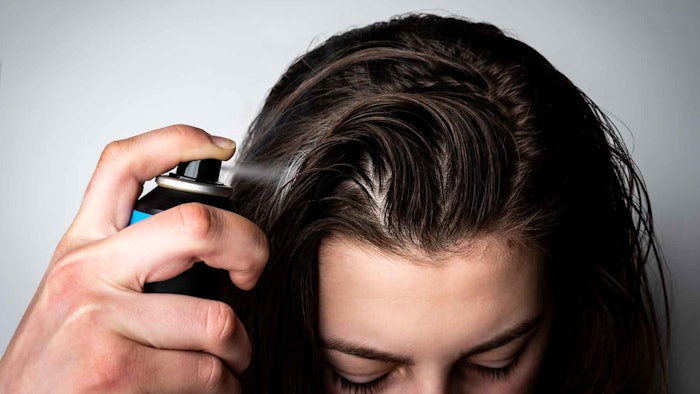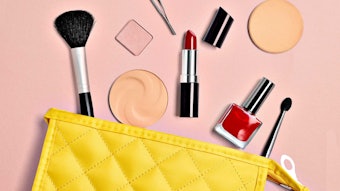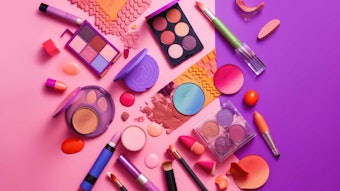
Lawsuits continue to make headlines over the benzene content in dry shampoos from Unilever, including its Dove, Nexxus, Suave, Tigi and Tresemmé brands; Johnson & Johnson's (J&J's) OGX brand; and L'Oréal's Redken brand. Olaplex also remains under fire for alleged Lilial content in its products reportedly causing rashes, itching, burning, hair loss and more despite tests showing its products are safe — which it even made publicly available.
While some (if not many) of these allegations may be unfounded or misguided, it underscores the critical role of safety and toxicity testing even under non-typical product use conditions. Following are some recent headlines.
See related: P&G Pays Out $8M in Benzene Settlement
Unilever Dry Shampoos
A report on March 2, 2023, from Lezdo Techmed, a company specializing in medical record review services, outlined for consumers the backstory to Unilever's voluntary product recalls, including a definition of what dry shampoos are and the potential dangerous effects of benzene. In a video report, the company noted the benzene was a contaminant from the product propellent.
As previously reported, Unilever U.S. issued a voluntary product recall on Oct. 18, 2022, regarding potentially elevated levels of benzene in select lot codes of dry shampoo aerosol products produced prior to October 2021. Cited brands included Dove, Nexxus, Suave, TIGI (Rockaholic and Bed Head) and TRESemmé.
According to Lezdo Techmed, following the discovery of the benzene content, Health Canada also ordered a recall in October 2022 for some 1,574,426 dry shampoo products sold under well-known drugstore names including Dove, Bed Head Tigi and Tresemmé. Futhermore, the company cited other benzene-related recalls of J&J's Neutrogena, Edgewell Personal Care's Banana Boat and Beiersdorf AG's Coppertone spray sunscreens; and P&G's Secret and Old Spice and Unilever's Suave spray deodorants.
Notably, Valisure was cited as the independent lab whose tests revealed the benzene content. Unilever, GlaxoSmithKline and the U.S. Food and Drug Administration (FDA) recent challenged the company's scientific methods and the validity of its findings. In a Feb. 16, 2023, opinion piece, the Wall Street Journal stated the dry-shampoo lawsuits "deserved to be tossed," criticizing that "maybe the press should investigate the credibility of its sources before amplifying its claims."
See related: Study Connects Hair Straightener Use to Incident Uterine Cancer
J&J's OGX, L'Oréal's Redken Dry Shampoos
Also on March 2, Law360 reported that J&J and Vogue International LLC made a "drastic" bid to throw out an Illinois-based suit alleging its OGX dry shampoo contains benzene. Medtruth added that if successful, this would prevent J&J from facing another wave of allegations claiming its dry shampoos cause cancer.
The court document cites findings that the OGX brand products contained "as much as 3.98 ppm of benzene." It also underscored the FDA's statement that "if the use of benzene is 'unavoidable in order to produce a drug product with a significant therapeutic advance,' then the drug product may contain up to 2 ppm of benzene.'"
Clearly, the products violated this limit. In addition, other dry shampoo products tested were found to be "below the lower limit of quantitation," which the suit claims demonstrates that products could have been manufactured without benzene.
In relation, a few months prior, on Nov. 22, 2022, a complaint was filed against L'Oréal's Redken brand dry shampoo alleging the aerosol contains high levels of benzene, potentially putting consumers at a higher risk of cancer. The suit claims the product contained 7.55 ppm of benzene.
Findings in both cases were attributed to Valisure labs.
Olaplex Lawsuits and Rebuttal
Lastly, on Feb. 16, 2023, Olaplex made the headlines again, this time in BBC News. The source stated some 28 women are suing the company claiming its products caused hair loss, blisters and other conditions. The lawsuit was filed in a California district court in on Feb. 9, 2023.
According to KTLA 5, Amy Davis, a Dallas-based attorney representing the plaintiffs, stated, “Since we brought the suit, we’ve been contacted by hundreds of other victims of the product that include both men and women and in some cases, children." Business Insider added on March 2 that another 70 Olaplex customers joined the hair loss suit. Further, per a report by BestValueSchools.org, searches on "Olaplex" increased by 79% by Feb. 24 since news of the lawsuit broke.
The suit claims the products contain Lilial and panthenol and that these ingredients can cause hair loss and the cited skin conditions. As previously reported, the original formula had contained Lilial but it was removed globally out of "an abundance of caution." The ingredient was banned in the European Union (EU) as of March 1, 2022, classified as a carcinogenic, mutagenic or reprotoxic (CMR) Category 1B substance under the EU and Great Britain Classification, Labelling and Packaging (CLP) Regulations.
Olaplex fired back by making publicly available safety assessments of its products, including numerous HRIPT tests, some specifically in sensitive skin. These are accompanied by a fact sheet explaining HRIPT tests to consumers. The company promoted the release of test results on Feb.16, 2023, on Instagram, complete with a video reel from Lavinia Popescu, chief scientist for Olaplex.
"There has been some misinformation circulating about our brand and our products, and I am here to explain the science," she said. Popescu emphasized the company's products do not cause hair loss or breakage, as demonstrated by both in-house and third party studies (those available on the company's website).
She also explained HRIPT tests are an industry standard and they measure the potential for skin irritation and inflammation or sensitivity. And, since the products do not cause inflammation in the hair follicle, they do not cause hair loss — since inflammation is the primary cause of hair loss.
"I am fully confident in the safety and efficacy of our products, and I hope this information brings you similar reassurance when using our products," she concluded; JuE Wong, CEO of the company, responded on Instagram against the allegations as well.










